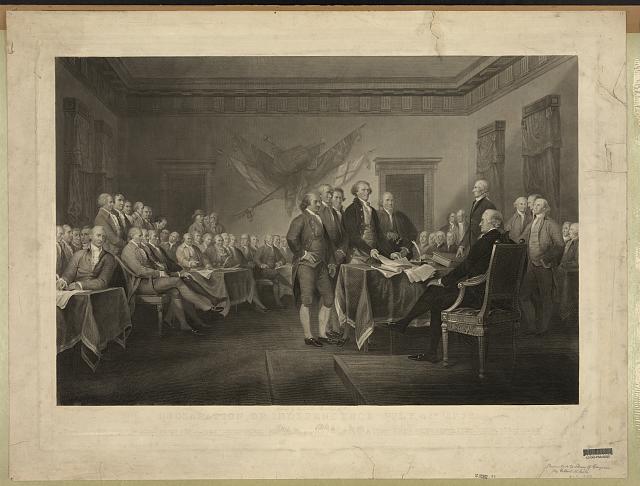
Pennsylvania Declaration of Rights
Many people are familiar with the protections afforded by the Bill of Rights to the federal Constitution. Fewer may be aware that Article 1 of the Pennsylvania Constitution, known as the Declaration of Rights, also provides broad protection of rights and liberties. Grounded in the belief that “All men are born equally free and independent and have certain inherent and indefeasible rights,” the Pennsylvania Declaration of Rights stands as a beacon of individual freedom throughout the Commonwealth and across time, implicating both historical occurrences and present-day litigation.
Prior to the ratification of the Declaration of Independence in July of 1776, the Continental Congress suggested that the thirteen colonies establish individual constitutions with a view to independence. Pennsylvania’s Constitution of 1776 was composed of two parts: a declaration of rights, and a “frame” or model of government.

Ormsby, Waterman Lilly, Engraver, and John Trumbull. Declaration of Independence, July 4th,/ painted by J. Trumbull ; engraved by W.L. Ormsby, N.Y. [Brooklyn, N.Y.: Cole & Co] Photograph. Retrieved from the Library of Congress, <www.loc.gov/item/96521535/>.
Despite intensive reworking of the state government structure, the rights outlined in 1776 have remained largely unaltered since the founding era, and heavily influenced the Federal Bill of Rights. These rights secured in 1776 continue to protect Pennsylvanians today and shape the legal process within the state.
Comprised of twenty-nine sections, the rights secured by Article 1 of the PA Constitution protect civil liberties, including religious freedom, freedom of press, and freedom of speech, provide protections to the accused, and prohibits discrimination on basis of sex, race, and ethnicity. These rights are foundational to Pennsylvania’s political identity and provide for a limited state government.
The Declaration of Rights have been expanded a number of times. Pennsylvania passed an equal rights amendment that ensures that all state laws provide equality for men and women. The environmental and educational protections have been held to provide private rights of action for individuals to ensure that the state is conserving environmental resources and providing effective education to students.
The complete language of Article 1 can be found here on the Pennsylvania General Assembly’s website. The rights protected in Pennsylvania’s Declaration of Rights as well as those in the federal Bill of Rights are foundational to our system of due process and the rule of law and are a proud example of our tradition of liberty.
When faced with a criminal or civil lawsuit, it is imperative to ensure that your rights are protected. The attorneys at Cornerstone Law are dedicated to protecting your constitutional rights while solving your legal problem. Contact us today to see how we can help.
